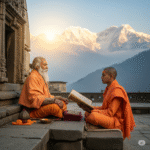New Delhi, 2025 — Hindu culture, with its rich history and enduring principles, has been the cornerstone of India’s social and democratic fabric for centuries. As the majority community in the world’s largest democracy, Hindus have often borne the responsibility of upholding secularism, ensuring that all citizens, regardless of religion or background, can coexist and thrive. This resilience and commitment to pluralism have played a pivotal role in preserving and strengthening India’s democratic values.
Hindu Culture and Its Democratic Ethos
Rooted in ancient traditions of dialogue, tolerance, and inclusivity, Hindu culture resonates deeply with the core principles of democracy. Philosophies like ‘Vasudhaiva Kutumbakam’ (the world is one family) and ‘Sarva Dharma Sama Bhava’ (equality of all religions) underline Hinduism’s commitment to respecting diversity — a key tenet of democracy.
Historical records reveal that systems like sabhas and samitis in ancient India fostered collective decision-making, embodying democratic ideals long before modern democratic systems emerged.
The Burden of Secularism on Hindus
- Majority Responsibility As the majority, Hindus have often taken on the mantle of secularism in India. This has included ensuring that religious minorities receive protection and equal opportunities. Despite being a secular state, many benefits such as subsidies for pilgrimage (like the Haj subsidy) and exclusive educational rights for certain communities are often seen as skewed towards minorities.
- Sacrificing Benefits for Equality Hindus, as the majority, have often forgone exclusive benefits in favor of secular policies. For example, places of worship for Hindus are subject to government control in many states, unlike those of minority religions. Yet, this regulation has been largely accepted as a way to maintain balance and harmony in the multicultural society.
- Tolerance Amidst Provocations Hindu resilience has been tested repeatedly, with the community often showing remarkable restraint and tolerance in the face of provocations, communal violence, and political rhetoric. This unwavering commitment to peace ensures that the democratic fabric remains intact.
Hindu Resilience as a Pillar of Democracy
- Preserving Pluralism Hindu culture’s openness to diverse viewpoints has allowed India to emerge as a vibrant, pluralistic democracy. Practices like interfaith dialogues, respect for other religions, and shared cultural spaces underscore the inclusivity championed by Hindus.
- Contributing to National Stability The majority’s adherence to democratic norms and their commitment to secularism have been instrumental in preventing the breakdown of social harmony, especially during periods of political or communal unrest.
- Promoting Non-Violence and Dialogue Influenced by leaders like Mahatma Gandhi, Hindu culture’s emphasis on ‘Ahimsa’ (non-violence) has shaped India’s democratic ethos. The preference for dialogue over conflict has strengthened democratic institutions and encouraged peaceful coexistence.
Challenges to Hindu Resilience
- Perception of Neglect Many Hindus feel that their contributions and sacrifices for secularism often go unacknowledged. This sense of neglect can foster resentment and division, posing challenges to democratic cohesion.
- Rising Polarization The politicization of religion and the use of Hindu identity as a political tool by various parties risk undermining the inclusivity that has been central to Hindu culture.
- Erosion of Cultural Practices Rapid globalization and urbanization have led to the dilution of traditional practices, making it essential to preserve cultural heritage while adapting to modernity.
A Balanced Path Forward
To ensure that Hindu resilience continues to support India’s democracy, efforts must focus on:
- Recognizing Contributions: Acknowledging the sacrifices and role of Hindus in preserving secularism can foster mutual respect and harmony.
- Equal Application of Secularism: Policies that treat all communities equally, without favoring any, can strengthen national unity.
- Promoting Cultural Education: Including teachings on Hindu culture’s contributions to democracy in school curriculums can instill pride and understanding in future generations.
Conclusion
The resilience of Hindu culture has been instrumental in upholding India’s democratic values for decades. By embracing tolerance, inclusivity, and non-violence, Hindus have laid the foundation for a democracy that thrives on diversity. Moving forward, recognizing and preserving this resilience will be crucial for ensuring that India remains a beacon of democratic strength and cultural harmony in the world.



















